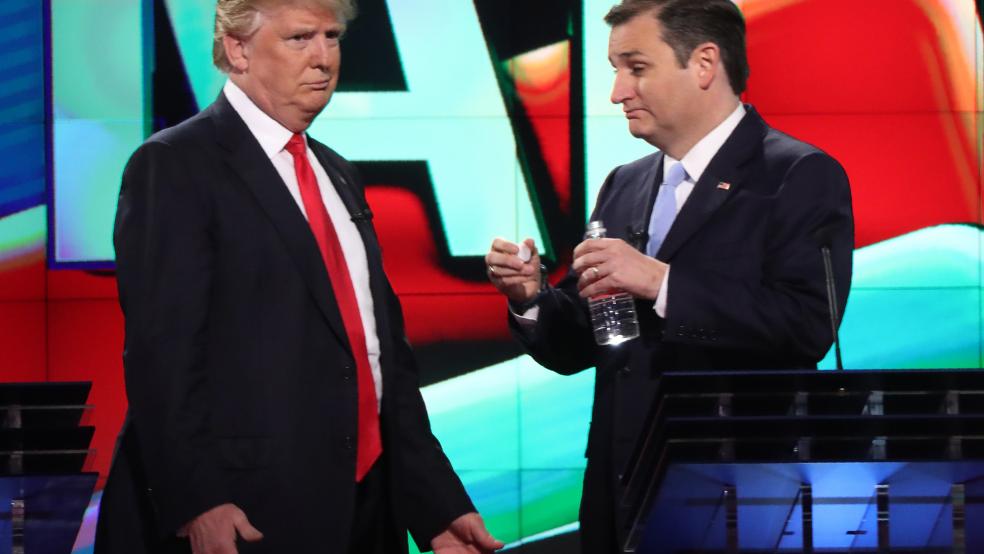The remaining candidates for the Republican presidential nomination met for their 12th debate last night, a weirdly subdued affair in which the opponents of the frontrunner tacitly acknowledged the futility of frontal assaults on Fortress Trump. Instead of the personal attacks on the frontrunner’s dubious business practices, his personal history and his vulgar language, the three runners-up stuck to policy issues, going into significant depth on trade policy, Social Security and relations with Cuba, among other things.
It’s a strategy that, employed at a different time in a different race, might have worn away at Donald Trump, now the almost-prohibitive favorite to win the nomination. But in a multi-candidate race, Trump has long since proved that his supporters’ opinion of him is largely immune to policy-focused criticism.
Related: 5 Times Donald Trump Condoned Violence Against Protesters
Last night, the shift to policy looked less like a return to seriousness and more like capitulation.
In an almost surreal introduction to the evening, Republican National Committee Chairman Reince Priebus took the stage before the debate got under way and said, “I want to get something really clear, because there has been a lot of talk about this. This party is going to support the nominee, whoever that is, 100 percent. There’s no question about that.”
Of course, if there were no question about it, Priebus wouldn’t have felt the need to open the proceedings last night by talking about it. There are actually quite a few questions about whether the Republican Party – meaning its masses of voters, activists and candidates, not Priebus’s narrower definition of the RNC’s campaign apparatus – will support a Donald Trump candidacy.
Many Republicans, plainly, will not support him. The so-called “Never Trump” movement in the party is real and growing. More and more, it looks as though a Trump nomination would be the hammer blow that finally splits the GOP along the fault line between traditional conservatives and those attracted by Trump’s nativist populism.
Related: Thousands of Defense Jobs Could Be Lost If Trump Gets Elected
Until last night, it seemed as though Trump’s competitors for the nomination, Texas Sen. Ted Cruz, Florida Sen. Marco Rubio and Ohio Gov. John Kasich, were still trying hard to prevent that from happening by taking down Trump before he can clinch the nomination.
Now that’s not so clear.
Rubio came into the night with the most to lose. Trailing badly in the delegate count and facing the very real prospect of losing to Donald Trump in his own state of Florida – a winner-take-all- contest on Tuesday that could hand Trump 99 delegates – he abandoned the juvenile attacks he had used in previous contests in an effort to get under Trump’s skin.
Rubio spoke knowledgably and expansively on policy issues, showing to nobody’s surprise that he has far greater command of them than the frontrunner. But Rubio’s performance last night seemed more like an effort to restore some of the personal dignity he lost by climbing into the mud with Trump two weeks ago than anything else.
Related: Obama to Trump – Thanks for Making Me Look Good
Cruz and Kasich also demonstrated their superiority to Trump in terms of policy knowledge and, in Kasich’s case, depth of experience in government. But again, neither went after Trump with real vigor.
For Cruz, the strategy now is to wait until the votes are counted Tuesday night and hope Rubio will be forced to drop out of the race, with Kasich following him out the door not long after. He would then face a months-long slog through the remaining primary states, with a focus on denying Trump enough delegates to assure a first-ballot nomination at the Republican convention in July. His gamble is that he could secure enough support in a contested convention to beat Trump there.
Kasich’s strategy is similar. If he can scrape along until the end of the race, helping to dilute Trump’s delegate count, he could find himself as the alternative to Cruz within the GOP establishment, where the Texas senator is not exactly a beloved figure.
But as Priebus’s introduction to the evening implicitly conceded, Trump is well on the way to locking up enough votes to win the nomination outright. When July rolls around, Cruz and Kasich may just have to join the RNC chair in picking up the pieces.





